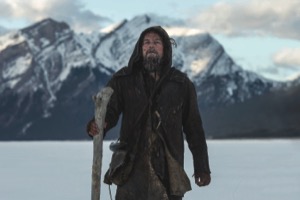
A great deal has been written, said and tweeted regarding how, for the second year in a row, each one of the 20 actors nominated for an Academy Award this year are white. According to the Los Angeles Times, the Academy is 94 percent white, 2 percent African American and less than 2 percent Latino. The median age is 62, and only 14 percent of the membership is under 50. And 77 percent of members are men.
Even if Hollywood as a whole is supposedly very liberal, old white men are in general not likely to support people of color – in whatever venue, whether film awards or politics.
The Revenant, a ruthless and bombastic tale of revenge in the cold western American frontier, is the kind of movie many men like. The Academy nominated it for 12 Oscars, more than any other this year, and the film is currently holding an 8.3 rating on IMDb, ranking it as the 124th greatest movie of all time. About 80,000 of the IMDb votes came from men, and 13,000 from women. I don’t want to say that men like The Revenant so much because no woman speaks in it, but of the two female characters, neither have audible lines in their few minutes on screen. (One is murdered, the other is raped.) According to the site’s stats, the women who saw the film rated it nearly as high as men, but any film executive will tell you that fewer women are drawn to films so violent, so depleted of female voices or faces, and so focused on themes of classic male heroism.
Much of the film is focused on a man battling nature, with Leo DiCaprio’s Hugh Glass trying to survive alone while severely wounded in the cold, snowy mountains; he dreams and hallucinates memories of his dead Pawnee wife and their son. He is trying to find Tom Hardy’s John Fitzgerald, a motor-mouth sociopath who, among other wretched acts, had abandoned Glass to die after the rest of their hunting party had (rather bizarrely) left Fitzgerald to care for him. Meanwhile, a band of Arikara Indians is hunting down the white men who kidnapped their chief’s daughter. With the battles between the various white men and the Arikara, the shockingly long scene where a grizzly bear mauls Glass, and the many ways many of the characters kill each other or are killed by nature, the film’s violence is, if not excessive, totalizing.
If aesthetics can be quantified (which I think is doubtful), The Revenant is every bit as great as Carol, Mad Max: Fury Road, or Spotlight, even if they have almost nothing in common with each other aside from being released in the same year and being almost entirely about white people. Iñárritu and his genius cinematographer Emmanuel Lubezki also collaborated with last year’s Best Picture winner Birdman, which was as claustrophobic, talky and experimental as The Revenant is epic, taciturn and classic in both its visuals and themes. The film’s brutality is only surpassed by its beauty. Hardy’s performance is deliciously evil, as searing as anything he’s done. DiCaprio will finally win his Oscar for playing Glass, partly for suffering so much for the role, but mostly for embodying a mythical American individuality, determination and masculinity that may be aging but is still beloved by the kind of people who are Academy members.
The Revenant
Directed by Alejandro González Iñárritu
Written by Mark L. Smith and Alejandro González Iñárritu
Starring Leonardo DiCaprio, Tom Hardy and Domhnall Gleeson
Rated R











